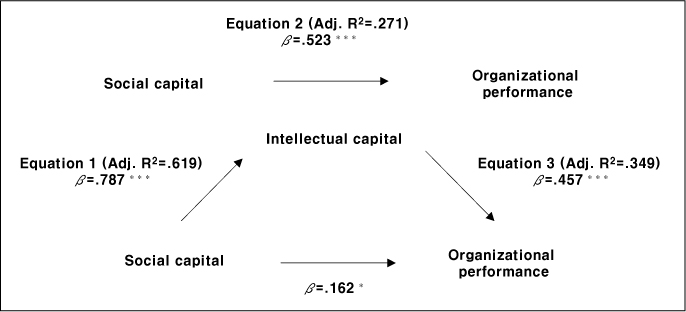J Korean Acad Nurs Adm.
2011 Mar;17(1):22-32.
Effects of Social Capital on Organizational Performance in Hospital Organization: Focusing on Effects of Intellectual Capital
- Affiliations
-
- 1College of Nursing, Chonnam National University; Research Institute of Nursing Science, Chonnam National University, Korea.
- 2Kidney Center, Department of Nursing, Chonnam National University Hospital, Korea. umbertoeo@hanmail.net
- 3Department of Nursing, Jeonbuk Science College; Research Institute of Nursing Science, Chonnam National University, Korea.
Abstract
- PURPOSE
The purpose of this study was to identify the effects of intellectual capital in the relationship between social capital and organizational performance in hospital organizations.
METHODS
A cross-sectional design was used, with a convenience sample of 390 nurses from 3 general hospitals in Gwangju and Chonnam province. Data were collected through a questionnaire survey done from May 1 to 15, 2009. Data was analyzed with descriptive statistics, Pearson correlation coefficient and hierarchial multiple regression using the SPSS WIN 17.0 program.
RESULTS
There was a significantly positive relationship between social capital, intellectual capital and organizational performance. Intellectual capital showed partial mediating effects between social capital and organizational performance. However, intellectual capital did not show moderating effects.
CONCLUSION
Accumulated social capital increased intellectual capital and the increased intellectual capital increased organizational performance. This finding suggests that as a contribution to the improvement of organizational performance in hospitals, creation and accumulation of social capital and intellectual capital are very critical.
Keyword
Figure
Reference
-
1. Baron RM, Kenny DA. The moderator-mediator variable distintion in social psychological research: conceptual, strategic, and statistical considerations. J Pers Soc Psychol. 1986. 51:1173–1182.
Article2. Bontis N. Intellectual capital: An exploratory study that develops measures and models. Manag Decis. 1998. 36(2):63–76.
Article3. Cabrita M, Vaz J. Intellectual capital and value creation: evidence from the portuguese banking industry. Electron J Knowl Manag. 2006. 4(1):11–20.4. Coleman JS. Social capital in the creation of human capital. Am J Sociol. 1988. 94(Suppl 1):S95–S120.
Article5. Covell CL. The middle-range theory of nursing intellectual capital. J Adv Nurs. 2008. 63(1):94–103.
Article6. Chung MH, Oh HS. Human capital, social capital and work group performance. Korean J Manage. 2007. 15(3):91–122.7. Davidson D. Strength in nursing leadership: the key to the evolution of intellectual capital in nursing. Nurs Adm Q. 2007. 31(1):36–42.8. Faul F, Erdfelder E, Buchner A. G*power 3: A flexible statistical power analysis program for the social, behavioral, and biomedical sciences. Behav Res Methods. 2007. 39(2):175–191.
Article9. Hall LM. Nursing intellectual capital: A theoretical approach for analyzing nursing productivity. Nurs Econ. 2003. 21(1):14–19.10. Jeung JH. Structural equation modeling in nursing productivity of nurses in a hospital. 2007. Seoul: Chungang University;Unpublished doctoral dissertation.11. Jung CY, Choi RG. SPSSWIN for Statistics Analysis, Ver. 14.0. 2009. 5th ed. Seoul: Muyok Publishing Co.12. Kim KJ, Chung BK. A study on the impact of intellectual capital on the innovative behavior: Focused on the moderating effect of psychological capital. Product Rev. 2008. 22(1):25–47.13. Korea standards association. National quality award judging standard. 2010. 03. 11. Retrieved March 17, 2010. from http://www.ksa.or.kr/download/2010nqa/10_qmhealth_criteria.pdf.14. Kym H, Kang YS, Jeong SH. The impact of intellectual capital on firm performance: An empirical study. Knowl Manag Res. 2003. 4(1):35–54.15. Lee SC, Suh YH, Han SS. Causal relationship among Baldrige health care criteria in Korean university hospitals. J Korean Soc Quality Manage. 2007. 35(4):1–15.16. Lee YC. Social capital, knowledge management, and organizational performance. J Inf Syst. 2007. 16(4):223–241.17. Lee YH, Kim AK, Ryu HG, Kim MR. Social capital and human resource development (II): Social capital of enterprises and corporate competitiveness in Korea. 2007. Seoul: Korea Research Institute for Vocational Education & Training.18. Moon YJ, Kym H. Towards an realistic framework for intellectual capital: Conceptual classification and assessment of components. J Bus Res. 2007. 22(4):379–409.19. Nahapiet J, Ghoshal S. Social capital, intellectual capital, and the organizational advantage. Acad Manag Rev. 1998. 23(2):242–266.
Article20. Oh H, Chung M, Labianca G. Group social capital and group effectiveness: The role of informal socializing ties. Acad Manag J. 2004. 47(6):860–875.
Article21. Park HB, Kang JS, Kim SM. The creation of social capital and intellectual capital, and their effects on organizational performance management. Korea Public Adm J. 2003. 12(1):3–36.22. Park HB. A study on promoting social capital in local government organization. Korean J Local Gov Stud. 2002. 6(1):221–237.23. Park SM. Influence of organizational social capital on the creation of new intellectual capital. 2001. Kwangju: Chonnam National University;Unpublished doctoral dissertation.24. Peng TJA, Pike S, Roos G. Intellectual capital and performance indicators: Taiwanese healthcare sector. J Intellect Cap. 2007. 8(3):538–556.
Article25. Preacher KJ, Hayes AF. SPSS and SAS procedures for estimating indirect effects in simple mediation models. Behav Res Methods Instrum Comput. 2004. 36(4):717–731.
Article26. Putnam RD. Making democracy work: Civic traditions in modern Italy. 1993. Princeton: Princeton University.27. Sobel ME. Leinhart S, editor. Asymptotic confidence intervals for indirect effects in structural equation models. Sociological methodology. 1982. San Francisco, SF: Jossey-Bass;290–312.
Article28. Suh ID, Doh JW, Jung KS. The mediating effects of social capital between organizational culture and organizational effectiveness. J Hum Resour Manag Res. 2009. 16(special):93–110.29. Weston MJ, Estrada NA, Carrington J. Reaping benefits from intellectual capital. Nurs Adm Q. 2007. 31(1):6–12.
Article30. Yoo SY, Kim IS. A study on the relationship between nursing organizational culture of military hospital and organizational performance. J Korean Acad Nurs Adm. 2005. 11(2):1–17.
- Full Text Links
- Actions
-
Cited
- CITED
-
- Close
- Share
- Similar articles
-
- Effects of Intellectual Capital on Organizational Performance of Nurses in Medium and Small Hospitals
- Effects of Nurses' Social Capital and Job Engagement on Nursing Performance: Focused on the Mediating effects of Organizational Citizenship Behavior
- Mediating Effect of Social Capital between Transformational Leadership Behavior and Organizational Citizenship Behavior in Hospital Nurses
- Effects of Nurses' Social Capital on Turnover Intention: Focused on the Mediating Effects Organizational Commitment and Organizational Cynicism
- The Mediating Effect of Social Capital on the Relationship Between Public Health Managers' Transformational Leadership and Public Health Nurses' Organizational Empowerment in Korea Public Health




